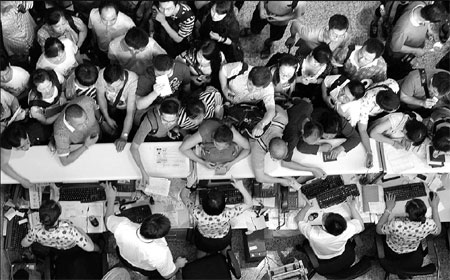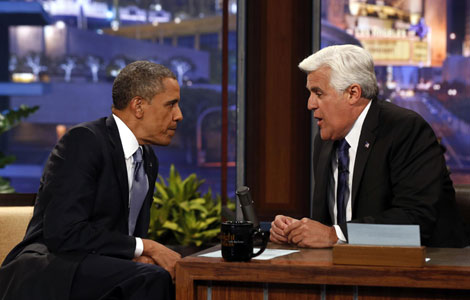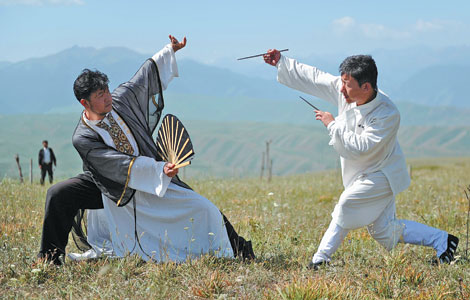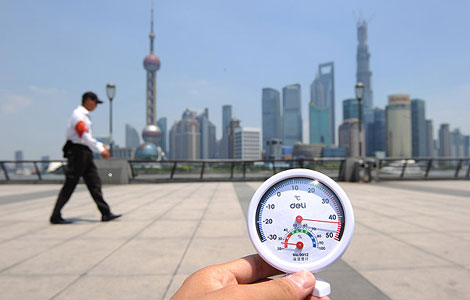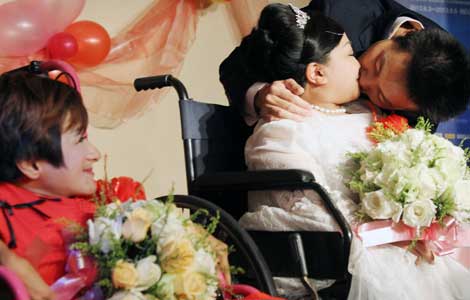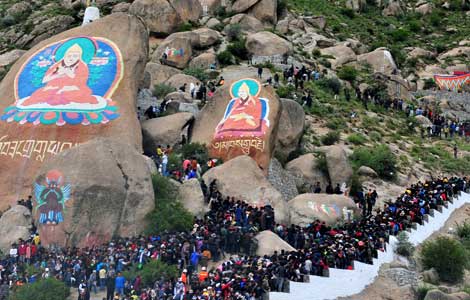Air force can help combat crowded skies, experts say
Updated: 2013-08-07 07:24
By Zhao Lei (China Daily)
|
||||||||

|
Passengers stranded at Shanghai Hongqiao International Airport inquire about ticket changes and cancellations on July 5, after all domestic flights departing Shanghai after 9 pm were canceled due to thunderstorms. Bad weather is only one factor that causes flight delays. Ding Ting / Xinhua |

The air force could gradually loosen its grip on China's airspace by choosing other options to combat flight delays, aviation experts say.
"According to our calculations, if the air force transfers just 10 percent of the airspace under its control to civil airlines, an extra 200 billion yuan ($32.6 billion) will be generated in GDP," said Professor Li Xiaojin from the Civil Aviation University of China.
"The government could also use a certain proportion of the revenue to build new air bases in regions that don't have so many routes, so pilot training will not be affected."
China's airspace is largely controlled by the military, and many areas are used by both civil airlines and military aircraft, leading to comparatively little space for civil aviation, say industry insiders.
"Less than 30 percent of China's airspace can be used by airlines," said an aviation expert who spoke on condition of anonymity. "In the United States, the figure is more than 85 percent."
He said there is huge interest in airspace designation and management, hence the air force is reluctant to relax its control.
Complaints from air passengers about long delays at major airports have grown in recent years.
"I hate to travel by air in summer," said Wang Yuying, a marketing manager at a Beijing software company. "More than half of my flights are delayed and, in June, when I flew with Air China to Shenzhen, I had to sit in the cabin and wait four hours before the plane was allowed to take off."
It is far from uncommon these days to see irritated passengers openly venting their anger at ground crew.
During the past two months, at least eight protests were staged in front of boarding gates after passengers were told their flights had been postponed or canceled, China National Radio reported.
In two incidents, passengers attacked airline employees, the report said.
The negative attitude toward airlines and airports intensified after the two biggest airports in China were given low flight punctuality scores by a United States-based data provider on air travel.
Beijing Capital International Airport, which has the most passenger traffic in China, ranked bottom of 35 major international airports in terms of delays and cancellations, FlightStats said in its latest report, released early in July.
Shanghai Pudong International Airport, the busiest airport in China's eastern and coastal region, ranked the second-worst performing airfield on the list.
Nearly 82 percent of flights that departed from Beijing airport in June were delayed, with 71 percent in Shanghai. By contrast, only 5 percent of flights from Tokyo International Airport, often referred to as Haneda, failed to depart on time, the report said.
No improvement
The on-time records of Chinese air carriers have remained unsatisfactory over the past three years, according to the Civil Aviation Administration of China.
In 2010, 74.9 percent of Chinese flights departed on time. The figure was 77.2 percent in 2011.
However, no improvement was achieved in 2012 - only 74.8 percent of flights took off on time.
Professor Li said the ultimate reason behind China's serious delays is that, "No one really treats passengers' interests as a top concern and they (airlines, civil aviation departments and the air force) are only concerned about their own interests."
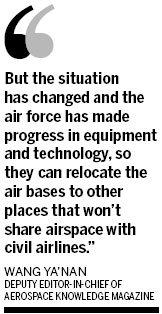
For example, he said, government and military authorities should understand airspace and utilize it to its potential, rather than merely control it.
"The civil aviation departments, airlines and military authorities should sit down to discuss how to properly use airspace to benefit the public," Li suggested.
In response to claims that the air force's control on airspace contributes most to flight delays, airspace authorities were quoted by China News Service on July 27 as saying nearly 34 percent of Chinese airspace is regularly used by airlines, around 25 percent by the military and the other 41 percent is unused.
A host of complications contribute to delays, officials said, explaining that 43.1 percent of late flights were caused by mismanagement or operational faults by airlines, 26.1 percent were caused by air traffic control measures and 20.9 percent by bad weather.
Military activity only caused 7 percent of delays, officials said.
Many air bases are near big cities, so when military aircraft need to use the airspace for training or other purposes, civil airlines have to ground flights or circumnavigate restricted areas, said Wang Ya'nan, deputy editor-in-chief of Aerospace Knowledge magazine.
"In the past, especially during the Cold War, the air force had to deploy aircraft near cities and areas with strategic significance to defend them," he said.
"But the situation has changed and the air force has made progress in equipment and technology, so they can relocate the air bases to other places that won't share airspace with civil airlines."
Today, he said, the air force could vacate areas in the airspace that affect busy routes, or at least release areas during traffic peaks or during bad weather.
"However, airlines should not wait for the military to act. They and the civil aviation administration must take measures to improve management and optimize flight schedules," Wang said. "Otherwise, even if the air force releases all airspace under its control, delays will still occur."
The editor recommended airlines use more wide-body jetliners on popular routes so more passengers can be transported on each flight.
Rapid growth
"The problem can't be resolved in a short period as it results from many elements, such as an inefficient air traffic control system," said Zhao Yifei, a professor studying air traffic management at Civil Aviation University of China.
"We have been witnessing a tremendous increase in air transport over the past decade and many other sectors in this industry couldn't keep step with the rapid growth in the number of flights," he said, citing that the US also had a difficult time in the 1960s and 1970s to maintain flight punctuality.
"Every country has to face this problem when their civil aviation market begins to flourish."
For passengers, delays are expected to occur less after the summer, but in the long term many will still have to sit in a seat waiting for a delayed flight until the government allows more access to the airspace, Li added.
zhaolei@chinadaily.com.cn
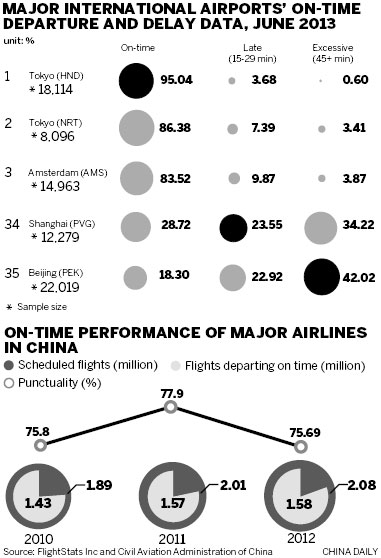
(China Daily USA 08/07/2013 page5)
Most Viewed
Editor's Picks

|

|

|

|

|

|
Today's Top News
China vows to severely punish newborn traffickers
Sri Lanka suspends NZ milk powder imports
PV firms face risks despite EU deal
Small firms should also think global
China issues record fines for dairy firms
US, China trade deficit narrows
NBA courts Sina Corp
EC denies delay in telecoms probes
US Weekly

|

|
